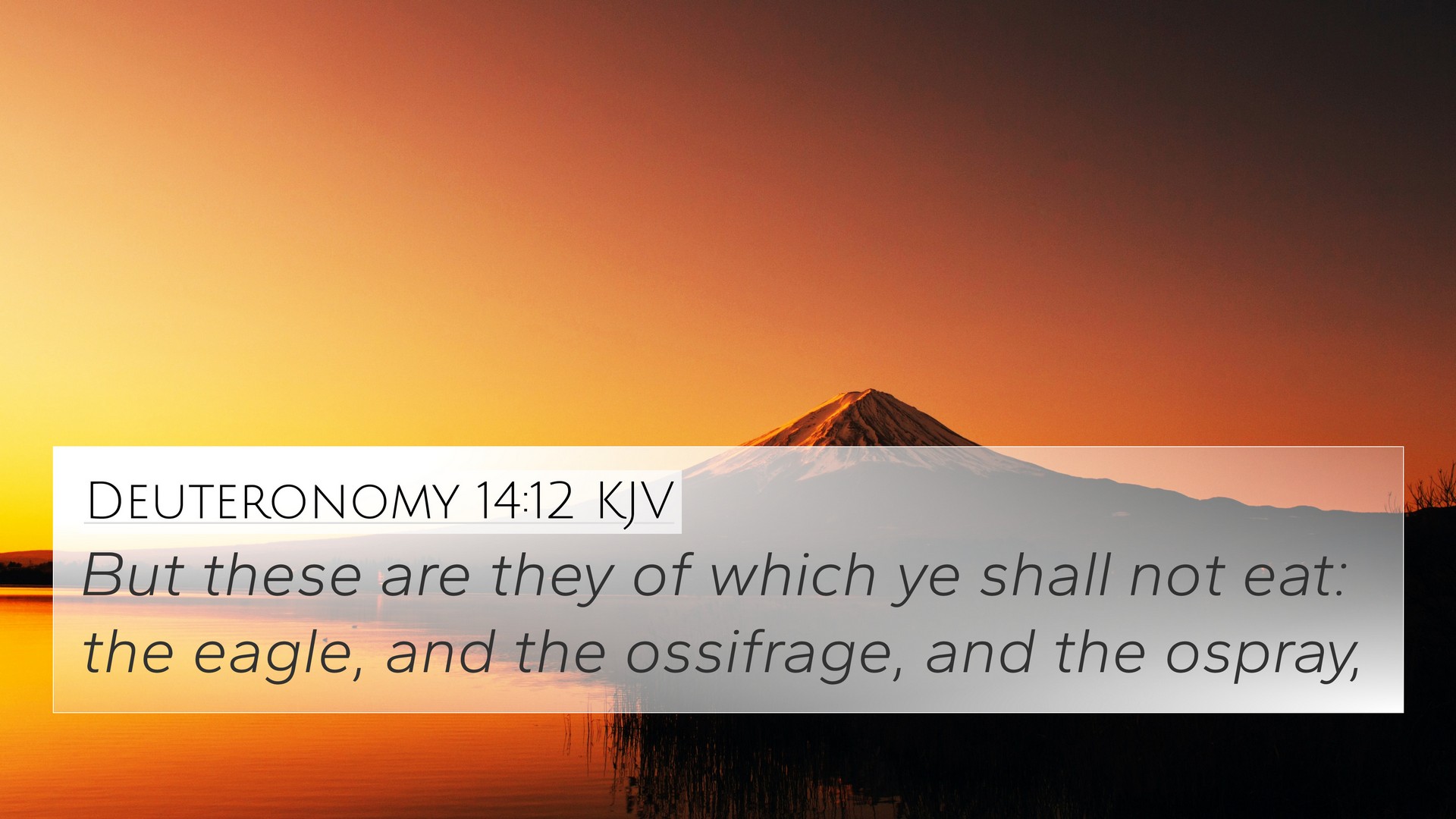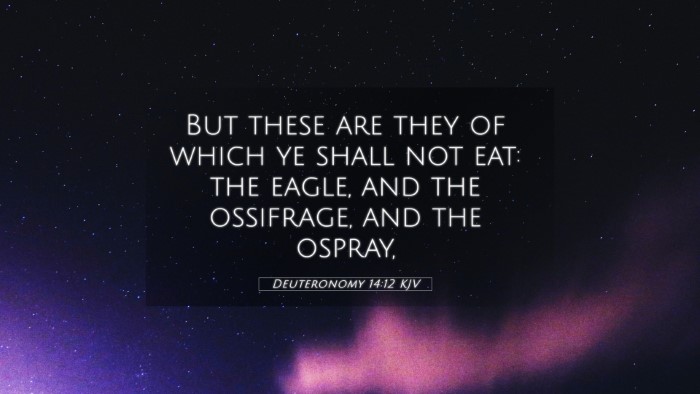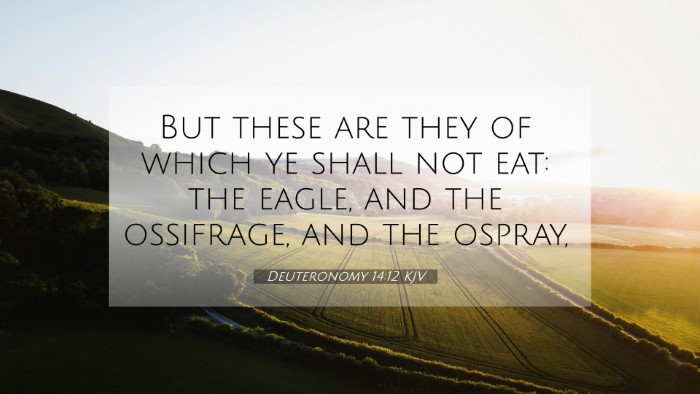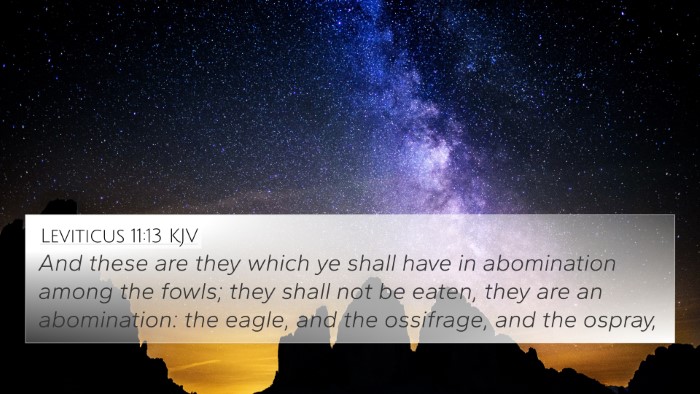Understanding Deuteronomy 14:12
Deuteronomy 14:12 states: "But these are they of which ye shall not eat: the eagle, and the ossifrage, and the ospray." This verse is part of a larger section in Deuteronomy where God outlines dietary laws for the Israelites. The passage reflects God's desire for His people to maintain ritual purity and separation from pagan practices.
Meaning and Context
The dietary laws serve multiple purposes, including:
- Holiness: The Israelites were set apart as a holy nation (Leviticus 11:44-45).
- Health: Some of the prohibited animals were likely unhealthy to consume, guiding the people towards better health (Leviticus 11:3).
- Obedience: Following these laws was a means for the Israelites to demonstrate their obedience to God (Deuteronomy 7:11).
Insights from Public Domain Commentaries
The commentaries of Matthew Henry, Albert Barnes, and Adam Clarke provide deeper insights into this passage:
- Matthew Henry: He emphasizes the significance of God's commands to ensure the Israelites remain distinct from their neighbors. The birds mentioned are not only common but are seen as "unclean," linking to broader themes of separation from idolatry.
- Albert Barnes: Barnes highlights that these dietary restrictions symbolize spiritual truths. The clean and unclean distinction is a metaphor for moral and ethical purity, implying that one's choices reflect spiritual health.
- Adam Clarke: Clarke addresses the practical implications of these laws, analyzing each bird's nature and known behavior, explaining how this reflects on the Israelites' identity as God's chosen people.
Cross-References
Thematic connections in the Bible can deepen our understanding of Deuteronomy 14:12. Here are some pertinent cross-references:
- Leviticus 11:13-19: Lists other birds that are considered unclean.
- Deuteronomy 14:3: Outlines additional prohibitions on unclean animals.
- Isaiah 65:4: Reflects on the behavior of the Israelites and their mixture with unclean practices.
- Matthew 15:11: Jesus clarifies that the spiritual state of a person is more important than dietary laws.
- Acts 10:12-14: Peter's vision where God declares certain foods clean represents the shift in New Testament understanding of purity.
- 1 Timothy 4:3-5: Paul discusses the sanctity of food and how all creation is good, broadening the interpretation of purity regulations.
- Revelation 21:27: In the new heavens and new earth, there will be no unclean thing, emphasizing ultimate purity.
Applications and Reflections
The study of Deuteronomy 14:12 encourages us to reflect on our own lives:
- Ethical Living: How do we maintain a lifestyle that aligns with divine principles?
- Spiritual Discernment: Are we able to distinguish what is spiritually beneficial from what is harmful?
- Obedience to God's Word: In what ways can we demonstrate our faith through our choices, much like the Israelites?
Conclusion
Deuteronomy 14:12 is rich in meaning and implications for both ancient Israel and modern readers. By understanding its context and connections through scriptural cross-referencing, we gain insights into God's character, laws, and expectations for His people.
For anyone looking to deepen their understanding of Bible verses, using tools for cross-referencing can be invaluable. Engage with various commentaries, and use Bible concordances or reference guides to see the interconnectedness of scripture.
Useful Tools for Bible Cross-Referencing
Engaging in cross-reference studies is a profound way to enrich your understanding of the Bible. Here are some resources and methods:
- Bible concordances: Useful for locating verses with similar themes or meanings.
- Cross-reference guides: Provide structured ways to explore connections between verses.
- Bible study methods: Consider using approaches such as thematic studies or comparative analyses.
- Chain references: Follow links provided in your Bible to study connected passages.
- Online Bible study tools: Many websites offer interactive ways to explore scripture.
Understanding Deuteronomy 14:12 and related verses creates a framework for exploring the themes of holiness, cleanliness, and faithful living, with rich commentary leading toward personal application.



